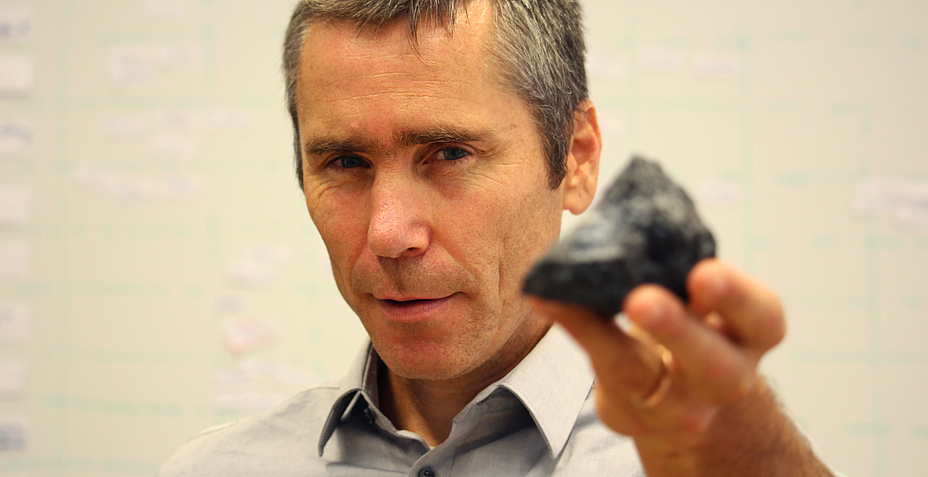“We deal with everything that disappears under the Earth,”
Roman Marte, head of the <link https: www.tugraz.at en institutes ibg home _blank int-link-external external link in new>Institute of Soil Mechanics and Foundation Engineering at
TU Graz, succinctly explains his subject. He’s trying to pass on his knowledge, experience and love for geotechnical engineering to his students in the bachelor’s and master’s programme. The passionate teacher with a penchant for motivation and provocation explains in the interview what counts towards a successful course.
News+Stories: You want your students to take part in the course intensively. Why is that?
Roman Marte: I’m primarily concerned with motivating young people. If you actually do some work yourself instead of just listening to a talk, then you remember so much more. For me, a lecture is only fun when there are discussions and questions. I love it when students contradict me or don’t believe everything I say, and question things I said in the discussion.
I love it when students contradict me.
This challenges and triggers discussions. And sometimes it can happen that they’re right and I’m wrong. It’s not pleasant but that’s the way it is.
You work using role plays and changes in perspective – how does this work?
Roman Marte: I do this most often in my “<link https: online.tugraz.at tug_online _blank int-link-external external link in new>Case studies in Foundation Engineering” course, where I work through real projects and problems with about 15 students. They work in groups and each person has to take on a role in the course of a project simulation, for instance, the planning office, competition, clients, neighbour and lawyers. We go through the project step by step and solution proposals are presented and discussed again and again. In the course of the project, we all change roles, and everyone has to have a rethink and change perspectives. I myself am a listener, motivator, anchorman, provocateur and controlling element. As soon as a group is ready to take the plunge, it becomes incredibly creative and entertaining. Solutions sometimes occur to the students which I hadn’t thought of, and which could be really good. And through the change in perspective they learn to get to know and understand the views of other project participants, possibly with quite contrary interests.
I myself am a listener, motivator, anchorman, provocateur and controlling element.
What I want to show them is that so much more belongs to a successful project realisation than what is purely technical. That you have to convince people, be able to sell yourself and your contribution, and that a good idea doesn’t always lead to a successful project when someone is working against it skilfully. This is what I want to prepare them for. And I’d like to show them the seriousness of the profession, while at the same time taking away the solemnity. We geotechnical engineers are often confronted with unpredictable damage and are sucked into problems. You have to avoid this and as much as possible leave it behind at the building site after work.
You’ve just described a small group but there are about 100 students in many of your lectures. What do you do, then?
Roman Marte: It’s the same in our foundation lectures. Of course, you can’t do exactly what I’ve just described. But I still try to interrupt the monolog with questions or small exercises. I often ask questions to which the students have to answer yes or no. I carry on the discussion often with the students who gave no answer at all, because they have to explain to me what other solutions there are apart from yes or no. This is how you can break the ice – when the students start laughing, but not at the cost of someone else. Sometimes my style leads to criticism in the evaluations, that there are too many discussions or that I don’t push through the subject matter according to plan. That can happen too.
Sometimes my style leads to criticism in the evaluations, that there are too many discussions or that I don’t push through the subject matter according to plan. That can happen too.
Why is this teaching style, with motivation and inclusivity, so close to your heart?
Roman Marte: If I just had to go there and explain what has to be explained, then I hope I’d have the courage and determination to give up. There would be no more place for me in the lecture room. It wouldn’t be fun any more if there was no more discussion or interaction. After my studies I did a Montessori training at kindergarten level. I think you should essentially optimise the usual kind of teaching with creativity and motivation.
Are there students who can’t deal with it?
Roman Marte: Yes of course. There are always students who never say a word unless you talk to them directly or provoke them. Then there are those who get involved just when it suits them. And then there are the 15 per cent who get involved wholeheartedly. Which doesn’t say much about how good they are in terms of the subject. Usually though, the ones who get involved in the discussion are those who are most interested in the subject and who I see again more often than not in the specialised courses.
Roman MARTE
Univ.-Prof. Dipl.-Ing. Dr.techn.
Institute of Soil Mechanics an Foundation Engineering
Rechbauerstraße 12
8010 Graz
Phone: +43 316 873 6230
<link int-link-mail window for sending>roman.marte@tugraz.at
<link http: soil.tugraz.at _blank int-link-external external link in new>
soil.tugraz.at




